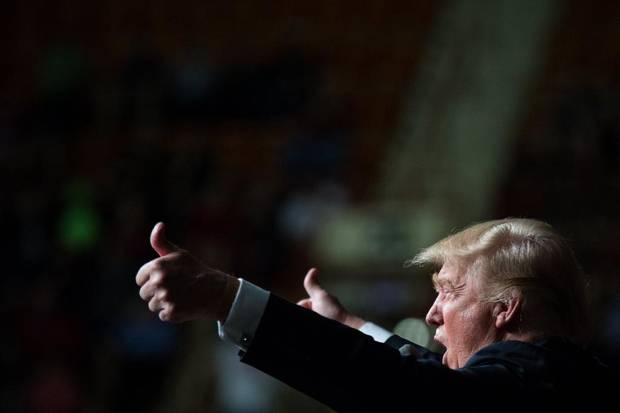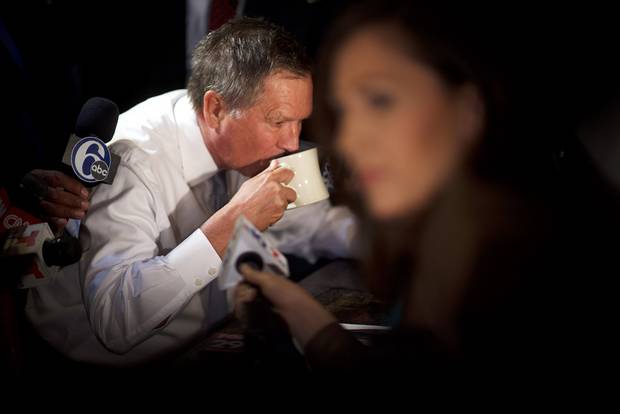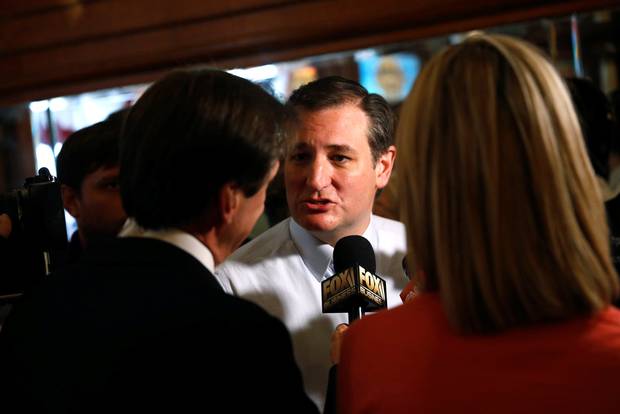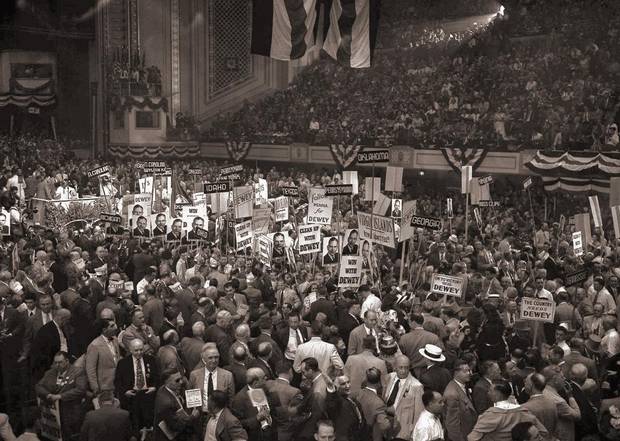
Donald Trump gives the crowd a thumbs up during a campaign rally in Harrisburg, Pa., last week. If Mr. Trump does not reach the required 1,237 delegates to win the Republican nomination outright, he’ll face an unpredictable contested convention in July.
Damon Winter/The New York Times
Politics makes strange bedfellows.
Canadian-born Tea Party darling Ted Cruz, a right-wing Texan dogmatist despised by most of his Republicans fellows in the U.S. Senate, and Ohio Governor John Kasich, an establishment insider and mainstream moderate, have consummated a tryst of common cause, seeking to thwart Donald Trump from claiming the party's presidential nomination.
It's a deliberate, desperate last-ditch effort to set up a contested Republican convention in Cleveland, where anti-Trump factions hope to snatch the nomination from the front-runner.
Outraged that their lust to thwart him has overcome the gaping ideological gulf separating them, Mr. Trump denounced his lagging rivals as "puppets of donors and special interests" and yet more evidence of "everything that is wrong in Washington and our political system."

Gov. John Kasich of Ohio, a Republican presidential hopeful, eats breakfast while speaking to reporters at the Penrose Diner in Philadelphia, April 25, 2016. Sen. Ted Cruz and Kasich have agreed to coordinate in future primary contests in a last-ditch effort to deny Donald Trump the nomination, with each candidate standing aside in certain states amid growing concerns that Trump cannot otherwise be stopped. (Mark Makela/The New York Times)
Mark Makela/The New York Times
Mr. Cruz and Mr. Kasich, urged on by the growing "Stop Trump" movement, agreed to divvy up some of the remaining states in the primary race, backing whichever one is more likely to damage Mr. Trump as they seek to deny him the 1,237 delegates he needs to win the nomination outright.
In one of his most honest campaign statements, the Donald, who for months has defied political convention, party insiders and a legion of pundits with a self-financed, blunt-speaking, often outrageous campaign that has driven more than a dozen rivals into oblivion, accused Mr. Cruz and Mr. Kasich of collusion, noting that sort of betrayal of principle was illegal in business.
"It is sad that two grown politicians have to collude against one person who has only been a politician for 10 months in order to try and stop that person from getting the Republican nomination," Mr. Trump said.
Neither Mr. Cruz, who trails Mr. Trump by nearly 300 delegates and is widely expected to fall further behind Tuesday as five more eastern states hold Republican primaries, nor Mr. Kasich, who has only won his home state, have even the remotest chance of catching the front-runner by June 7, when California closes out the primary season.
Yet, both are hanging on in a naked and, now joint, plan to force the convention past the first ballot, for which delegates are bound to back the candidate that a majority of Republican voters picked. The thwart-Trump scenario envisions delegates defecting after the first ballot.
Many in the Republican establishment, aware that polls show Mr. Trump losing massively to any Democratic opponent, are hoping a contested, multiballot convention in July will pick a more-electable compromise candidate.
Understandably, that scenario infuriates Mr. Trump, who has won the most states, the most votes and will go to Cleveland with a commanding lead. Darkly, he has warned of the risk of riots if the convention steals the nomination from him. "The system is rigged, it's crooked," he says. And polls back him, finding a majority of Republicans believe the candidate with the most votes should become the nominee.
"They gotta do something about it. The Republican National Committee better get going because I'll tell you what, you're gonna have a rough time at that convention in July," Mr. Trump said.
But the system isn't rigged – just complex, almost Byzantine – and Mr. Trump has been routinely outfoxed by the better ground game of rivals, such as Mr. Cruz, who have loyalists among delegates pledged to Mr. Trump. As for the rules, the party's convention in Cleveland is a self-governing entity. It can – and almost certainly will – change or introduce new rules before any rounds of voting.

U.S. Republican presidential candidate Ted Cruz (R-TX) speaks with the media at a campaign event at Zaharakos Ice Cream Shop in Columbus, Indiana, U.S., April 25, 2016.
Aaron P. Bernstein/REUTERS
Neither Mr. Trump's rivals nor the party's establishment accept his assertion that he's being unfairly treated.
"Donald, it ain't stealing when the voters vote against you – it is the voters reclaiming this country and reclaiming sanity," said Mr. Cruz, who openly predicts a contested convention and hopes that the strong antipathy to Mr. Trump among a majority of Republicans makes him the most likely alternative.
Meanwhile, Republican National Committee chairman Reince Priebus has become increasingly testy over Mr. Trump's accusations. "If Donald Trump, if he was winning the majority of votes, he'd likely have the majority of delegates," Mr. Priebus said. "But that's not actually what's happening. He's winning a plurality of votes, and he has a plurality of delegates. And under the rules and under the concept of this country, a majority rules on everything."
The delegate math so far
Each state has its own method of selecting delegates and its own rules for binding them to a particular candidate. For instance, New York State's method of divvying up the state's 95 delegates gave all 14 statewide delegates to Mr. Trump because he won more than 50 per cent of the overall vote. He also picked up 75 additional delegates for wining most of the state's 27 congressional districts. Other states have simple winner-take-all rules. Some, such as Colorado, have conventions with no voting. Others are purely proportional. Votes don't count, delegates count.
So far, Mr. Trump has won 47 per cent of the pledged delegates. To reach 1,237 before the convention, he needs to win 58 per cent of delegates not yet assigned in states still to hold primaries.
That includes the biggest prize of all, California, where 172 delegates – more than 40 per cent of the 392 delegates Mr. Trump still needs – are at stake. Only 10 are awarded to the winner of the state, three go to party officials and the remainder are divvied up based on the winner of each of 53 congressional districts. Along with six other states voting on June 7, the delegate race may, for the first time in decades, be decided by the last to vote.
The first rule of contested conventions is there are no rules
Equally complex are state rules for binding delegates. A few delegates are entirely unbound, meaning they can vote for whichever candidate they like. Most are required by their state to vote for a designated candidate for the first round of convention balloting. Some states, such as Texas, require two rounds of loyalty. Florida requires three. So, a candidate who doesn't win on the first round is in uncharted waters.
And even delegates pledged to a particular candidate aren't required to vote in accordance with that candidate's preferences on rule revisions. So a Trump-designated delegate who doesn't like the man or believes he will wreck the party's chances of winning the presidency might vote for a rule against Mr. Trump's interest even while being bound to vote for him on the first ballot. The rules committee is composed of delegates.
One rule that will attract early attention is 40(b) – created four years ago to keep libertarian Ron Paul from becoming a nominee by requiring that candidates win at least eight states to be eligible. This year, those seeking alternatives to Mr. Trump and Mr. Cruz will need that rule removed.
Other rule changes that could be considered, given the prospect of a chaotic and contested convention, include whether delegates will vote on secret ballots after the largely orchestrated first round.
History is no help
Mr. Trump was a diaper-clad, two-year-old toddler the last time Republicans fought a multiround battle over picking their presidential nominee.
That was 1948 and it took three ballots to confirm New York Governor Thomas Dewey, the Republican front-runner, as the party's presidential nominee. He went on to lose to President Harry Truman in a cliffhanger of an election.

In this June 23, 1948, file photo, delegates with posters and state signs crowd down the center aisle at Convention Hall in Philadelphia during a demonstration for Gov. Thomas E. Dewey after his name was placed in nomination during the Republican National Convention. Dewey won the Republican presidential nomination on the third ballot of a contested convention in Philadelphia. Months later, he lost the general election to Democratic incumbent Harry S. Truman.
AP Photo
To find a convention even remotely resembling what's planned by the anti-Trump forces in Cleveland in July requires looking back nearly a century into an entirely different era of U.S. politics.
The last multiballot contested convention where an underdog won and Republicans eventually picked someone other than the front-runner as its presidential standard-bearer was in 1920, when it took 10 rounds of balloting to nominate Warren Harding, who started in fifth place with the scant support of only 6 per cent of the delegates.
That pre-TV convention in Chicago was all-white and all-male, in an era before primaries, when party bosses ruled and secret deals in smoke-filled rooms were the norm. Harry Daugherty, who was Mr. Harding's campaign manager, was quoted as saying: "I don't expect Senator Harding to be nominated on the first, second or third ballots, but I think we can afford to take chances that about 11 minutes after two, Friday morning of the convention, when 15 or 12 weary men are sitting around a table, someone will say: 'Who will we nominate?'"
A grateful Mr. Harding, who won the presidential election that fall, appointed Mr. Daugherty as the country's Attorney-General.
Five scenarios of contested convention
There's a bewildering array of possible outcomes in the most unpredictable and surprising Republican race in decades. Instead of the party, after eight years of a Democratic president, looking to a mainstream candidate, an unwieldy field of 17 hopefuls created a chaotic and bitterly acrimonious race and the real possibility of a contested convention.
Among the possible scenarios, the following five illustrate the spectrum of outcomes, albeit in no particular order:
1. Mr. Trump wins by amassing the 1,237 delegates before the convention or persuades a handful of uncommitted delegates to get him over the top on the first ballot.
2. Mr. Trump falls short of a majority on the first ballot and his vote total declines in the second (and perhaps subsequent) ballots as delegates are released from their binding obligations. Mr. Cruz, who came second on the first ballot, holds his loyal supporters and gains sufficient Trump defectors to win on the second or third ballot.
3. The convention is deadlocked after multiple ballots with neither Mr. Cruz nor Mr. Trump able to reach 1,237 and the two rivals – who have viciously attacked each other for months, including Mr. Trump posting unflattering pictures of Mr. Cruz's wife and claiming the Canadian-born right-winger is constitutionally barred from being president – agree to join as presidential and vice-presidential candidates on a single ticket.
4. A deadlocked convention turns to Mr. Kasich as the compromise candidate – much as Mr. Harding won in 1920. Suggestions that the convention look beyond declared candidates to draft the well-liked and widely respected House of Representatives Speaker Paul Ryan have been unequivocally rejected by Mr. Ryan, who may have his eye on 2020.
5. Mr. Trump, thwarted from winning the Republican nomination despite amassing the plurality of the votes during the primaries, makes good on his threat to run as an independent if the party "doesn't treat him fairly." That option seems doomed if only because several key states – including Texas and Florida – have filing deadlines for write-in candidates before the Republican convention ends.